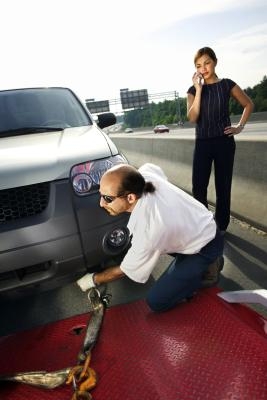
While it may seem to some that tow trucks are above the law in New York, they are regulated under the state's general business laws in article 26, and New York's administrative code title 20. New York regulates the licensing, operation, and towing methods employed by tow companies, and places penalties including vehicle forfeiture on any unlicensed tow trucks operating within the state.
Pursuant to section 20-498 of the state administrative code, a tow truck operator must be licensed to operate a tow vehicle. The operator must be an adult of at least 18 years of age. New York City tow operators must also possess a tow truck company license.
A vehicle which is obstructing traffic may be towed to a storage facility under section 20-511 of business code. The owner of the vehicle may be charged towing and storage fees. Vehicles damaged in an accident that cannot be safely driven are removed by a tow truck, the operator of which must be a participant in the Directed Accident Response Program which places additional licensing requirements on a tow truck operator.
Tow rates are listed in section 20-509 of the administrative code. The maximum allowed fee that can be charged is $50 for the first mile and $4 dollars for each additional mile. Storage costs may not exceed $15 for each twenty-four hour period for the first three days, and then may rise to $17 a day for the fourth day forward. Additional fees may also be levied for any additional labor involved in moving or positioning the towed vehicle.
Law enforcement officers may seize the tow truck of anyone operating a tow truck without a valid license. The township which seizes the illegally operating tow truck may initiate a forfeiture action to permanently possess the tow truck. Where a vehicle is forfeited, the township may elect to either retain the vehicle for public use, or dispose of the vehicle by public sale.